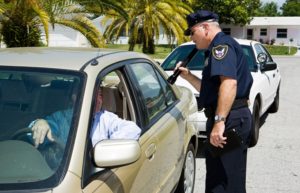
No driver is ever happy to see blue and red lights in their rearview mirror. When it becomes clear that the lights and sirens are directed at you, you may feel inconvenienced, frustrated, or even nervous depending on the circumstances.
Traffic stops are one of the most common parts of law enforcement. However, in some cases, routine traffic stops can lead to more serious consequences than a warning or citation. Understanding your rights and the best practices in a traffic stop can help you make confident decisions in this situation.
Ask If You’re Being Detained
Federal law requires that traffic stops take a reasonable amount of time in the circumstances. After the initial stop, if you are on the roadside for half an hour or more, ask if you are being detained. If the officer does not have cause to arrest you, and therefore does not have cause to detain you, you have the right to continue your drive.
Control Your Emotional Response
You may be on high alert during a traffic stop. While this response is natural, one of the best steps you can take to improve the outcome of a traffic stop is to stay calm and polite regardless of the conduct of the officer.
Don’t Answer Uncomfortable or Incriminating Questions
While as a general rule you should cooperate with and answer questions asked by law enforcement officers at traffic stops, you are not legally required to answer any questions. If the officer asks any questions that seem irrelevant or leading, decline to answer.
In this situation, you are also within your rights to ask if you are being detained. If the officer intends to transport you to the police station for formal questioning, you can request a lawyer.
Don’t Consent to a Search Without a Warrant or Probable Cause
Many drivers assume that they must or at least should let a law enforcement officer search their vehicle if the officer asks during a traffic stop. However, these searches take time, can lead to property damage, and may strengthen the case against you in court if you are arrested.
While you should not resist a search to the point of endangering yourself, if the officer does not have a signed search warrant or probable cause, you should not verbally consent to the search.
Record Questionable Conduct
Citizens have the right to take audio or video recordings of traffic stops. In most cases, you will not need to do so. However, if you feel that something is not right, begin recording and then ask, “Am I being detained?”
You may also want to ensure that you record an officer’s response when you ask him or her to produce a warrant before searching your vehicle.
Request Officer Information
If you find any of the circumstances of your traffic stop questionable, you have the legal right to request the officer’s information, including name, rank, and badge number. You may want to take this step if the reason you were stopped seems unclear, you were detained for a long period of time, or you think your rights were violated.
In some states, an officer’s badge number is included on his or her name tag. If you feel uncomfortable or unsafe asking for identifying information, take note of the name and any other information on the tag.
Stay in Your Car Unless Asked to Exit
In most cases, a law enforcement officer will not ask you to get out of your vehicle at a traffic stop unless he or she is going to search the car or arrest you. For your safety and to avoid any appearance of threatening the officer, do not leave your car if you have not been asked to do so.
If an officer attempts to force you out of your car without a warrant or probable cause, record the encounter, but do not resist as doing so increases your risk of injury and legal complications. If the officer produces a warrant or cites probable cause for a search, exit your vehicle and follow other directions calmly.
Stop at Checkpoints
Not all traffic stops happen when a cop pulls you over. Many routine traffic stops happen at checkpoints. You are required to go through an established checkpoint on your route. Avoiding a checkpoint violates the law and can potentially lead to an arrest even if you haven’t done anything else illegal up to that point.
Use these guidelines in any situation where you have been stopped or pulled over by a member of law enforcement. If you know that you have exigent circumstances that might affect the reason you were pulled over or the outcome of the stop, take these factors into consideration as well.
For example, if you carry a firearm, use the guidelines in our previous blog, “How to Behave When You Get Pulled Over and Carry a Firearm,” to avoid any potential misunderstanding with the officer.
If you are arrested after a traffic stop, don’t leave your safety and future uncertain. Work with legal professionals, including the bail bondsmen at All Star Bail Bonds, to resolve the situation quickly.
